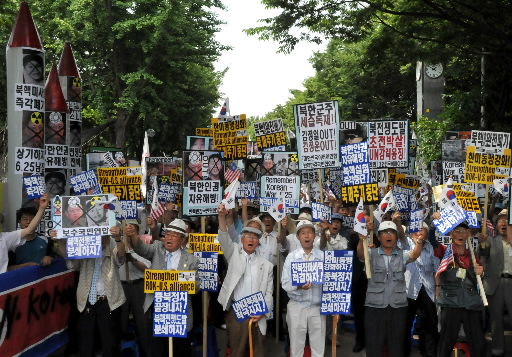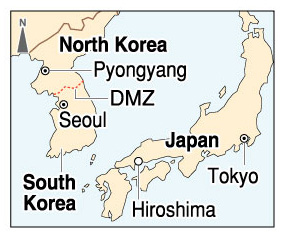Nuclear weapons can be eliminated: Chapter 6, Part 1
Jul. 27, 2009
Chapter 6: Instability in Northeast Asia
Part 1: Still at war
by Junichiro Hayashi and Yumi Kanazaki, Staff Writers
Calls for stronger nuclear defenses in South Korea
Security in Northeast Asia is shaken whenever North Korea conducts a nuclear test or launches a missile. In South Korea the spirit of reconciliation, which had prevailed for the past 10 years, has crumbled, and there are growing calls for nuclear armament among some in Japan. Will Northeast Asia be left behind in the growing international trend toward a world without nuclear weapons? Amid difficult circumstances, how can the path to denuclearization be opened? The Chugoku Shimbun examined these issues.
The Korean War began 59 years ago on June 25, 1950. In a park in the center of Seoul, 300 members of a conservative citizens’ group raised their voices in anger, calling for an immediate halt to the North’s nuclear testing and the overthrow of its military-first dictatorship. The demonstrators displayed models of missiles and raised placards in repeated protests against North Korea.
One man leaped onto the bed of a truck and shouted, “The war hasn’t ended yet!” Though a ceasefire was called in the Korean War in July 1953, the war has never officially ended. A 4-kilometer wide demilitarized zone stretches for 241 kilometers along the 38th parallel. The military boundary that runs through it is the actual border between the two countries.
The building housing the National Assembly of South Korea is located beside the Han River. Hwang Jin-ha, 62, a member of the ruling Grand National Party, said emphatically, “North Korea says its nuclear weapons development is for its own defense, but it doesn’t look that way. Their behavior is destroying regional stability.”
Following North Korea’s nuclear test on May 25, the Grand National Party formed a 15-member Task Force for North Korea Nuclear Provocation, and has been studying measures to address the issue. Mr. Hwang, who serves as vice president of the task force, said his focus is on “resolution through dialogue,” but other task force members advocate hard-line measures.
They advocate theories such as strengthening the U.S. nuclear umbrella, and “nuclear sovereignty” under which South Korea would aim to acquire nuclear technology like that of Japan. Others propound the development of nuclear weapons for self-defense.
Of course, there are those in South Korea’s political circles who feel this trend is risky. Kim Sunggon, 56, a member of the National Assembly from the opposition Democratic Party, said, “Even if we intimidate North Korea, they will just resist. We can’t send the wrong signal.” Mr. Kim served as chair of the Assembly’s Defense Committee during the administration of the late Roh Moo-hyun, who worked toward reconciliation. Based on that experience, he said, “Solving the nuclear problem requires patience and reconciliation. If we do not maintain that stance, we will go astray.”
Meanwhile, on June 16, Japan’s House of Representatives unanimously adopted a resolution calling on the government to take a leading role in the abolition of nuclear weapons. The House of Councillors followed suit the next day. Sixty-four years have passed since the atomic bombings of Hiroshima and Nagasaki, yet this was the first legislative resolution to bring the issue of nuclear abolition to the fore.
The April 5 speech by U.S. President Barack Obama in Prague in which he called for a world without nuclear weapons provided the impetus for this landmark resolution, which was prepared under the leadership of Yohei Kono, speaker of the House of Representatives. Katsuei Hirasawa, 63, who was involved in the discussions on the wording of the resolution, as a director of the House of Representatives Steering Committee, said no strong objections were expressed.
Koichiro Gemba, 45, also a director of the committee, said, “As a matter of fact, I wanted to respond immediately after the Prague speech.” But North Korea launched a missile on the same day as the speech and later conducted a nuclear test, so a resolution condemning these actions was given priority.
As a state of war continues in Northeast Asia, efforts to abolish nuclear weapons have found little support.
(Originally published on July 11, 2009)
To comment on this article, please click the link below. Comments will be moderated and posted in a timely fashion. Comments may also appear in the Chugoku Shimbun newspaper.









